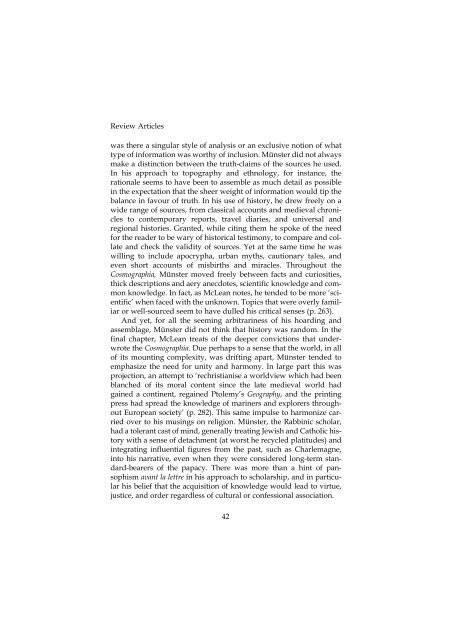Download - German Historical Institute London
Download - German Historical Institute London
Download - German Historical Institute London
Create successful ePaper yourself
Turn your PDF publications into a flip-book with our unique Google optimized e-Paper software.
Review Articles<br />
was there a singular style of analysis or an exclusive notion of what<br />
type of information was worthy of inclusion. Münster did not always<br />
make a distinction between the truth-claims of the sources he used.<br />
In his approach to topography and ethnology, for instance, the<br />
rationale seems to have been to assemble as much detail as possible<br />
in the expectation that the sheer weight of information would tip the<br />
balance in favour of truth. In his use of history, he drew freely on a<br />
wide range of sources, from classical accounts and medieval chronicles<br />
to contemporary reports, travel diaries, and universal and<br />
regional histories. Granted, while citing them he spoke of the need<br />
for the reader to be wary of historical testimony, to compare and collate<br />
and check the validity of sources. Yet at the same time he was<br />
willing to include apocrypha, urban myths, cautionary tales, and<br />
even short accounts of misbirths and miracles. Throughout the<br />
Cosmographia, Münster moved freely between facts and curiosities,<br />
thick descriptions and aery anecdotes, scientific knowledge and common<br />
knowledge. In fact, as McLean notes, he tended to be more ‘scientific’<br />
when faced with the unknown. Topics that were overly familiar<br />
or well-sourced seem to have dulled his critical senses (p. 263).<br />
And yet, for all the seeming arbitrariness of his hoarding and<br />
assemblage, Münster did not think that history was random. In the<br />
final chapter, McLean treats of the deeper convictions that underwrote<br />
the Cosmographia. Due perhaps to a sense that the world, in all<br />
of its mounting complexity, was drifting apart, Münster tended to<br />
emphasize the need for unity and harmony. In large part this was<br />
projection, an attempt to ‘rechristianise a worldview which had been<br />
blanched of its moral content since the late medieval world had<br />
gained a continent, regained Ptolemy’s Geography, and the printing<br />
press had spread the knowledge of mariners and explorers throughout<br />
European society’ (p. 282). This same impulse to harmonize carried<br />
over to his musings on religion. Münster, the Rabbinic scholar,<br />
had a tolerant cast of mind, generally treating Jewish and Catholic history<br />
with a sense of detachment (at worst he recycled platitudes) and<br />
integrating influential figures from the past, such as Charle magne,<br />
into his narrative, even when they were considered long-term standard-bearers<br />
of the papacy. There was more than a hint of pansophism<br />
avant la lettre in his approach to scholarship, and in particular<br />
his belief that the acquisition of knowledge would lead to virtue,<br />
justice, and order regardless of cultural or confessional association.<br />
42













